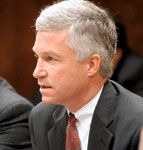Arkansas examines the obesity crisis
The Arkansas surgeon general testified about how his state is fighting the obesity epidemic.

Obesity is a "medical emergency," said Dodd, who noted that his subcommittee had previously heard testimony that this generation of U.S. children may be the first in history to live shorter, less healthy lives than their parents. Dodd is the top-ranking Democrat, behind chairman Edward Kennedy (D-Mass.), on the key Senate Health, Education, Labor and Pensions (HELP) committee. He is also chair of its Subcommittee on Children and Families, which held this hearing. The hearing was one of several on the issue held in Congress this summer.

Meanwhile, Thompson said, Arkansas is "changing our Medicaid and SCHIP programs so primary health providers are reimbursed for actually providing that support. Both the Institute of Medicine and the American Academy of Pediatrics, since about 2002, have said parents ought to know their child's BMI percentile every year, to make sure they are managing this risk. When we talked to parents, almost no parents had been given their BMI percentile through regular clinical process." He added, "We did a simple addition to the screening process that was in place within schools."
Asked about parents' reaction, Thompson said that 90,000 letters went out the first year to parents whose children were obese or overweight. Thompson said he got about 150 "pretty irate" calls questioning the state's right to intervene. But, he indicated, that would be a low complaint rate for many businesses.
The BMI screening in schools is part of a larger effort mandated by a 2003 Arkansas law that also required improving access to healthier foods in schools, including changing access to and contents of vending machines, establishing physical activity requirements, and publicly disclosing school "pouring rights" contracts, which are exclusive selling agreements between a beverage distributor and an organization.
An independent assessment up through the fourth year of the program found a doubling of parents of overweight children who recognized their children had a problem. The assessment also found a 10% increase in students who are physically more active than two years before, and some changes in the patterns of vending food buying by overweight students.
"We have actually declined to support other communities and other states in measuring their BMIs, because they weren't doing the whole package," said Thompson. "It's wrapping all this support around parents, and then providing them information. It's not pointing an accusatory finger."